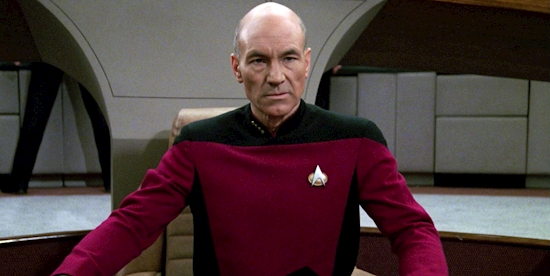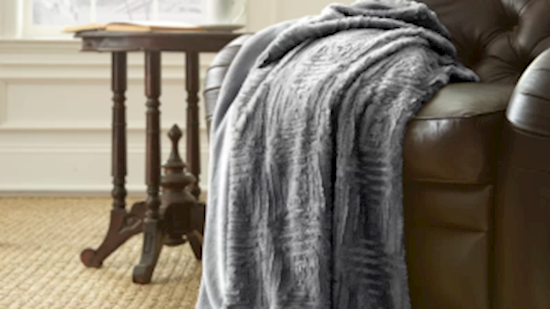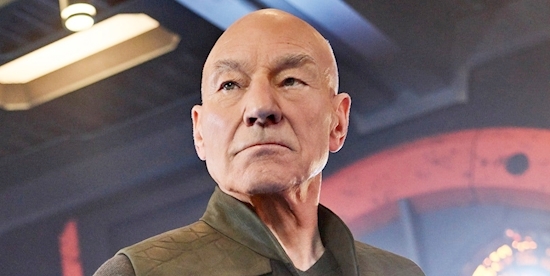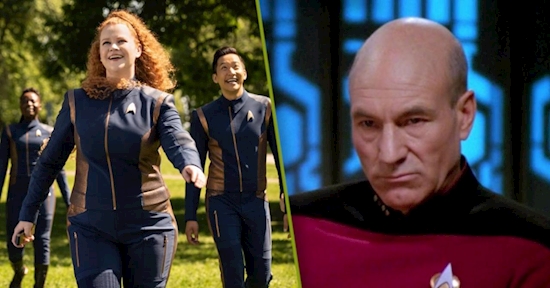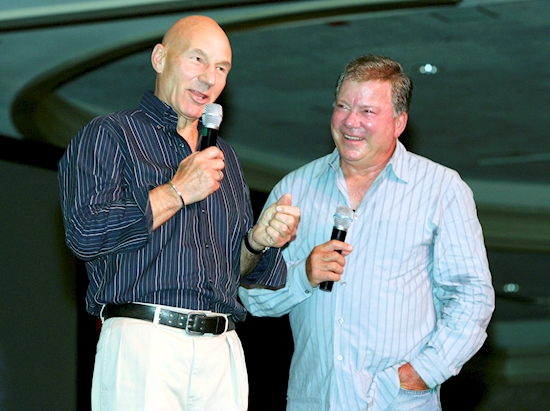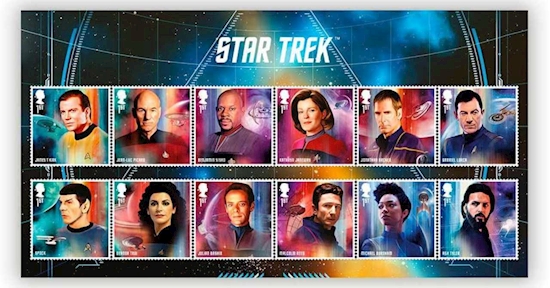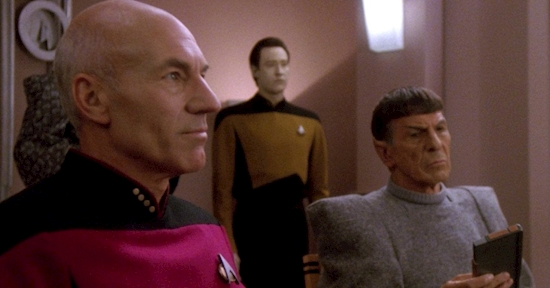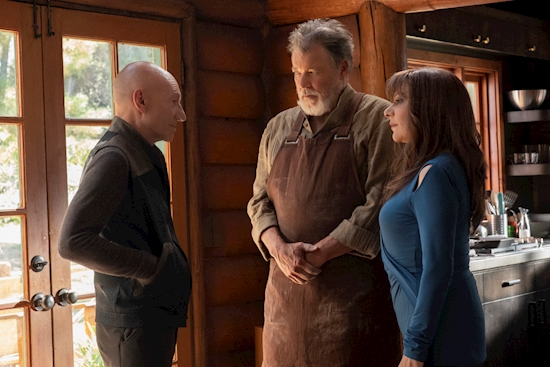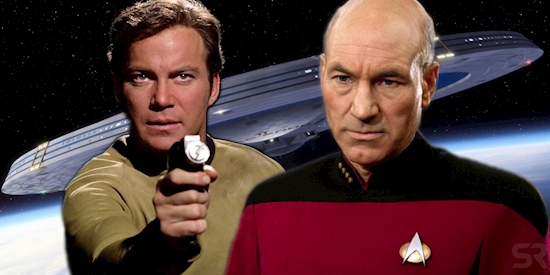Star Trek: The Next Generation – Making sure that history never forgets the name Enterprise
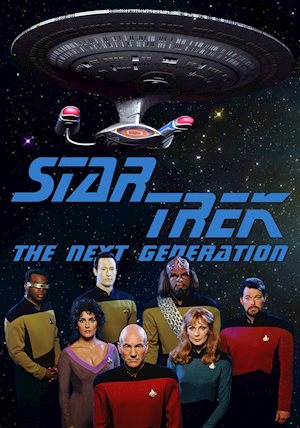 The importance of Star Trek: The Next Generation to pop culture evolution cannot be understated. Put simply, this could be the most important American television show ever produced and is definitely tops among genre TV programming.
The importance of Star Trek: The Next Generation to pop culture evolution cannot be understated. Put simply, this could be the most important American television show ever produced and is definitely tops among genre TV programming.
Not only was The Next Generation following a full-on phenomenon the likes of which is unmatched in American television, the program would be sent straight to syndication and was to be produced without the support of a national network. And yet, this cast of unknowns lad by original series creator Gene Roddenberry ultimately carved its own nice in American pop culture history.
Set one century beyond the time of Kirk & Spock’s bunch, this Enterprise and its governing United Federation of Planets existed in a different universe. Peace with the Klingons had been won sometime in the past, and the galaxy had been tamed to the point that the maverick megalomaniacs and insane gods so prevalent in the 23rd century were gone. And the ST:TNG series and production reflected this smoother, slicker tone: Captain Picard was as likely to create a peaceable diplomatic solution to a crisis as Captain Kirk had been to fistfight aliens.
It may be said that ST:TNG had at least two advantages over its predecessor: Budget and acting. With a healthy investment make in the production, effects were provided by George Lucas’s charges at Industrial Light & Magic and were quite frankly the best-looking stuff on TV in 1987; compare what Battlestar Galactica was doing eight years earlier – never mind Star Trek of the 60s – to see the technological advance.
On the acting side, what better choice could have been made than to put former Royal Shakespeare Company actor Patrick Stewart at the helm? The contrast of Stewart’s Picard to William Shatner’s Kirk was stunning and perfect – exactly what a next generation needed. By century’s end, TV Guide was calling him the Greatest TV Actor of the 1990s – and, if you ask Star Trek Guide, Brent Spiner was the Greatest Supporting TV Actor as well.
Star Trek: The Next Generation ultimately ran for seven seasons on American TV, more than doubling the number of original series episodes before transitioning into four Star Trek films. Not at all bad for a sequel to an all-time classic…
Buy Star Trek Picard special edition Blu-ray set on sale
Source: digitalspy.comFirst Look at McFarlane's New Star Trek Action Figures
Source: io9.gizmodo.comHow Whoopi Goldberg Details Joined Star Trek The Next Generation
Source: cbr.comWhat Star Trek: TNG Character Are You Based On Your Zodiac?
Source: cbr.com5 Star Trek Characters Who Would Survive A Terminator Attack (& 5 Who Would Be Terminated)
Source: screenrant.comStar Trek: Discovery Calls Back To Captain Picard In An Unexpected Way
Source: wegotthiscovered.comStar Trek: The Borg Tried To Stop First Contact...Because of Doctor Who
Source: screenrant.comStar Trek: Discovery Connects Its Crew to Captain Picard
Source: comicbook.comDiscovery Season 3 Creates A Star Trek Plot Hole With TNG Drink
Source: screenrant.comStar Trek: 10 Biggest Technological Advancements Of The Enterprise Ships
Source: screenrant.comStar Trek: 10 Things You Never Knew About Galaxy Class Starships
Source: screenrant.comStar Trek: Generations: Originally, the film would've been ship vs ship
Source: redshirtsalwaysdie.comCreepshow Season 2 Casts Marilyn Manson & Ted Raimi
Source: screenrant.comStar Trek: Lower Decks - 10 References You Totally Missed
Source: screenrant.comWil Wheaton recalls how Whoopi Goldberg saved Star Trek: The Next Generation
Source: metro.co.ukStar Trek Getting Postal Stamps in the UK
Source: comicbook.comStar Trek: Discovery Season 3 Episode Title Teases Picard and Spock Team-Up Sequel
Source: comicbook.comStar Trek Theory: The Titan's arrival could be a sign of a Riker/Troi series
Source: redshirtsalwaysdie.comStar Trek: Lower Decks - Ranking Season 1 Episodes From Best To Worst
Source: screenrant.comStar Trek: How Old Are The Heroes? Their True Age & Birthday
Source: screenrant.comThe Next Star Trek: Picard Novel Is All About Riker
Source: io9.gizmodo.comStar Trek: Discovery Season 3 Episode Title Teases Sequel To Iconic TNG Story
Source: wegotthiscovered.comStar Trek: The Next Generation – Cast and crew
In terms of off-camera missions, The Next Generation crew faced the greatest challenge of any Star Trek crew. Captain Picard and his charges were tasked with chasing up perhaps the all-time cultist of cult shows, yet substituting gravitas and drama for camp and cheesiness. It isn’t easy following a legend, but Star Trek Guide dares say that the TNG crew succeeded brilliantly.
Though never on a par with The Original Series in terms of cultural impact, characters such as Picard, Data and Worf – not to mention the amazing antagonists the Borg – have indeed made their marks on pop culture in a way that those of Deep Space Nine, Voyager and Enterprise never did. Picard lives on in the minds of young ‘uns who’ve never seen an episode, and Q has been transmogrified into the otherworldly trickster Discord on My Little Pony, much to many a brony’s delight…
Captain Jean-Luc Picard (Patrick Stewart) – Described by Honest Trailers as “the most British Frenchman ever,” Picard descended from stock seemingly equal parts devoted to the family winery (producer of fine wines since at least the time of Captain Georgiou) and various sorts of exploration. After a glorious run at commanding the Enterprise, Picard’s future is murky, given the considerable number of conflicting alternate realities presented through the show’s run. Pretty consistently, however, Picard is shown to serve the Federation with distinction as a fleet admiral and/or ambassador.
Commander William T. Riker (Jonathan Frakes) – Though that T stands for “Thomas” rather than “Tiberius,” we can definitely call Riker the Kirk of this Enterprise crew: A lady’s man extraordinaire who’s no stranger to the rough stuff nor to leading dangerous away missions, this Alaskan helps run a disciplined but friendly bridge crew. By far the oddest aspect of Riker is his willingness to serve as second in command under Picard for, what, 10 years at least? Seriously, dude was considering moving up before that Wolf-359 thing and then he just forgets about the possibility? Is this the same guy who, in Q’s alternate-universe construction, lectures Ensign Picard about his lack of risk-taking? WTF, Will?
Lt. Commander Data (Brent Spiner) – Arguably the most popular TNG character and with good reason. Brent Spiner manages to elevate this potentially bland Tin Man of Oz type into a real, well, person with depth and insight. Ironically, through the run of the show, audiences discover more about Data’s “family” than that of nearly any other crew member: In this series, we get Data’s creator and doppelganger, the prototype Data calls “brother”, an “offspring” created by Data in an effort to reproduce, and even a representation of his “mother.” (Star Trek: Enterprise later brought Data’s creator’s granddaddy to screens as well…)
Lt. Geordi LaForge, chief engineer (LeVar Burton) – If you need a guy to smoothly spout technobabble and save the ship’s bacon with a minimum of Scottyesque grandstanding, Geordi LaForge is your guy. If you’re looking for a ladies man, however … let’s just say you’re looking elsewhere. As seen in Star Trek: Voyager, LaForge (at least in one reality) goes on to captain the starship Challenger – but he probably still can’t get any.
Lt. Commander Worf (Michael Dorn) – Within the ST universe, Worf is outstanding as the first Klingon ever to go through Starfleet Academy. As a character, Worf is the vehicle via which his culture is expounded upon. And hoo boy, does TNG devote much time to Klingon-based story arcs to mostly fantastic effect. From time to time, his son Alexander is left in his care. Time and again, Worf’s measured responses (even for a Federation sort) must make for real puzzlement on Qo’noS, where Worf is most assuredly considered a serious weirdo. At the conclusion of TNG, Worf moved over to Star Trek: Deep Space Nine, thus becoming the most frequently seen character in all of ST lore with some 275 appearances to his credit.
Counselor Deanna Troi (Marina Sirtis) – Introduced as “half Betazoid, half Starfleet officer” (apparently that’s a species), Troi’s usefulness to the Enterprise centered on her empathic abilities. However, these tended to work properly only when necessary to advance the plot. A number of Troi-centric episodes are among the worst of the TNG lot and apparently the role of counselor on Federation ships and bases was considered so utterly irrelevant that 13 of the 14 seasons’ wroth of Deep Space Nine and Voyager featured no such character at all, though Deanna did sneak into a few episodes of Voyager in the later run of that show.
Dr. Beverly Crusher (Gates McFadden) – A brilliant medical mind who was once married to a first officer killed while under Picard’s command. This somehow resulted in an underlying feeling of sexual tension between her and Picard that thankfully remains mostly undeveloped aside from some alternate-universe takes. As a character, Crusher isn’t given as much time to shine as most other ST series’ doctors and poor Beverly features in some real clunkers (although we mustn’t forget the excellent “Remember Me”). In the meantime, she’ll be in sickbay running some more tests.
Wesley Crusher (Wil Wheaton) – As though confirmation that television viewers hate the Brainiac child genius character on science-fiction shows were needed in the late 1980s/early 90s, Star Trek: The Next Generation brought us Dr. Crusher’s young son Wesley. A shame it was that the series writers simply just did not seem to know what the hell to do with this character, for Wil Wheaton was just coming off an amazing star turn in Stand By Me and ultimately went on to become a real lord among geeks, killing it at ST conventions and on The Big Bang Theory alike. Also, shut up, Wesley.

